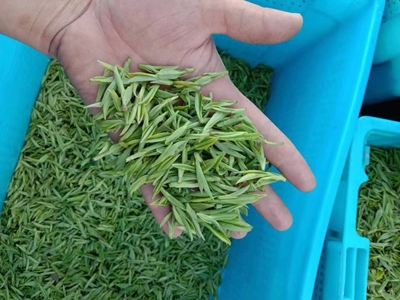
Snake farmer Yang Xiaoxia sells tea and other agricutual products on WeChat amid COVID-19 outbreak. Photo: Courtesy of the interviewee
Yang Xiaoxia, a snake farmer in Deqing, East China's Zhejiang Province never expected 2020 would bring her such appalling financial distress as the Chinese government imposed a temporary ban on all wildlife trade in the wake of the COVID-19 outbreak.
"No snake trade is allowed nationwide now and we have suffered huge financial losses as our snakes can't be sold and the more than one million yuan ($143,000) hasn't been paid by our customers," Yang told the Global Times. Yang's annual net profit exceeded 200,000 yuan before the coronavirus epidemic befell.
Yang added that "at home we still have a total of 19,530 snakes and snake products worth more than one million."
32-year-old Yang is one among the hundreds of snake farmers in Zisiqiao Village in Deqing, dubbed as China's first snake village, whose livelihood is hit hard by this deadly outbreak.
Zhang Fan, an official of the Xinshi town, administering Zisiqiao, told the Global Times in 2019, 90 percent of the current 182 households in Zisiqiao breed snakes as their main income source.
With 1.5 million snakes incubated annually, the village has yielded revenue of 30 million yuan ($4.3 million).
Effective from January 26, no wildlife trade is allowed either through markets or online, and violators will face severe penalties, according to the regulation by China national administration of forestry and grassland.
"I am trying to sell some agricultural products such as bamboo shoots, tea, eggs, through my Wechat, among friends so that I can earn some income. For other farmers, some of them applied for temporary positions with low pay; some began fishery business selling seafood, and a majority can only stay at home without any income reeling under the current scenario," Yang said.
Yang and her husband adopted snake farming from their elderly relatives after the couple graduated from Zhejiang Chinese Medical University. As the younger generation of snake farmers, they once hoped to tap on the bigger international market as the medicinal value of snake products is being gradually recognized among people not only in Asia but Europe and America.
"We have to wait and see what new policy will be implemented as the epidemic is brought under control in China," Yang sighed.

